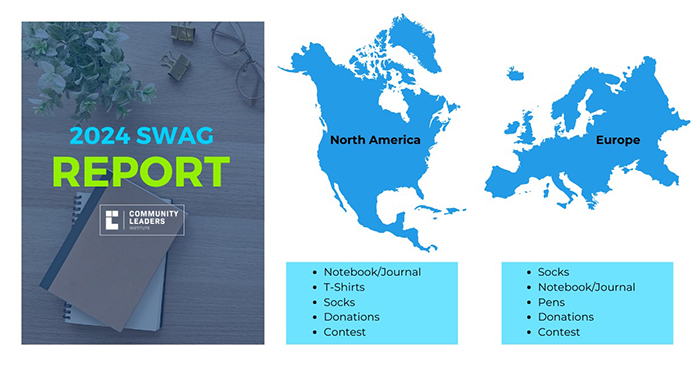With trade shows and events, almost every detail matters – including the choice of swag. Our curiosity about preferences and deciding factors drove us to gather data and understand this topic more deeply. To that end, we at CLI surveyed more than 250 professionals in North America and Europe to uncover trends and guide marketers in using their swag dollars wisely.
We’re happy to share some of the high-level results here. Overall, we are at a pivotal moment for event planners and marketers alike – where budgets are tight, and attendees are more demanding.
A Shift Towards Sustainability and Practicality
The results clearly showed a significant departure from traditional, often forgettable giveaways. Today’s professionals strongly prefer items that are not only practical but also environmentally friendly. This shift is not merely a trend but a reflection of attendees’ growing consciousness of sustainability and usefulness in the items they receive.
Easily far and away, the safest item to offer event attendees is quality notebooks (which we recommend are made from recycled materials). These items are appreciated for their utility and alignment with the values of a socially responsible audience.
Surprising to some of us who attend lots of events, the interest in clothing items, such as t-shirts and socks, ranks high. Some may complain that they have a ton of these items, but we must remember that it’s not about us so much as about the attendees. This was also a clear takeaway – to remind ourselves to separate our opinions from our preferences and cater to what our attending audience wants.
But that’s not all; there are other considerations at play – maybe not historically considered. For example, we uncovered slight regional variations that revealed how cultural and regional dynamics influence swag preferences. For example, here are the differences between Europe and North America:

Significant shifts also occurred depending on seniority, gender and industry. Each of these will impact what is on your table for attendees, so consider not placing all your eggs in the basket of offering one item only. It was also clear from our research that people expect swag and are concerned about the environment. Donations to charitable causes threaded the needle of keeping everyone happy.
The most important thing we learned is that knowing your event audience demographics will be the most significant determinant of whether you’ll be stuck shipping boxes back to the office or begging folks to take a case of hand sanitizer home with them in their luggage.
We hope you enjoyed these higher-level findings, and if you’re interested in receiving the full report, as well as numerous other research reports and educational resources exclusive to our premium CLI members, you can learn more here.
Don’t miss any event-related news: Sign up for our weekly e-newsletter HERE, listen to our latest podcast HERE and engage with us on LinkedIn!




Add new comment